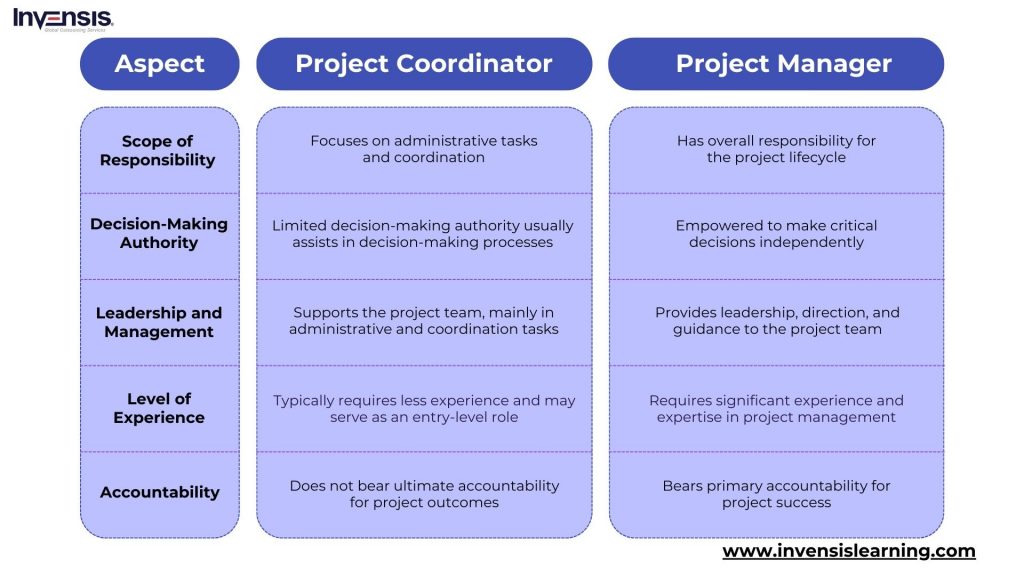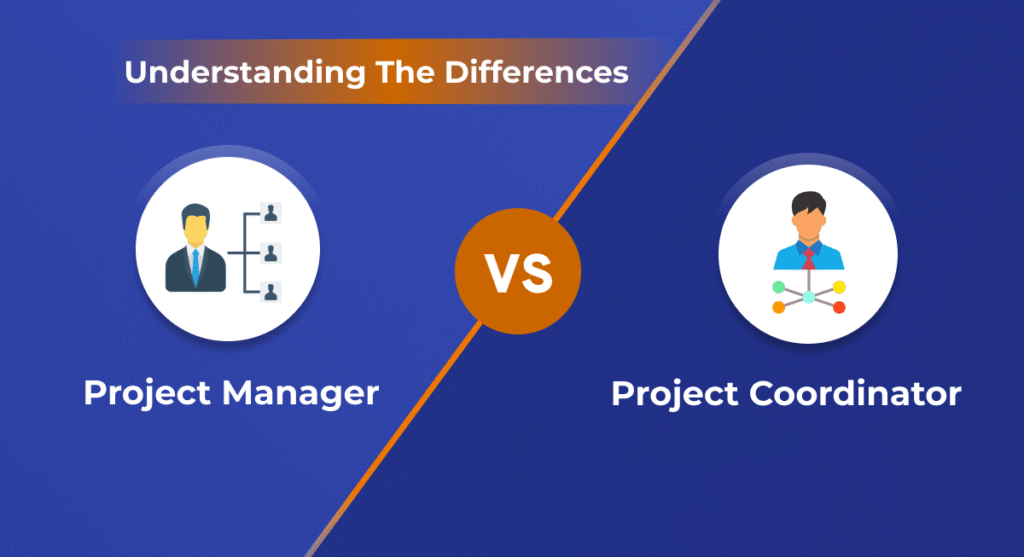Have you ever found yourself tangled in the web of project tasks, unsure whether you need a project manager or a project coordinator? You’re not alone.
Many people, just like you, are trying to navigate the world of project management and coordination, seeking clarity on their distinct roles. Understanding the difference between these two can be crucial to your success, whether you’re managing a team or working on a solo project.
Imagine being able to streamline your project processes, enhance efficiency, and achieve your goals with ease. Doesn’t that sound appealing? Dive into this article to uncover the nuances between project management and project coordination, and discover which one suits your needs. Your journey to mastering project roles starts here.

Credit: www.invensislearning.com
Roles And Responsibilities
Understanding roles and responsibilities is crucial in project management and coordination. Both roles support project success but have distinct tasks. Knowing these differences can improve project outcomes. Let’s explore the specific duties each role involves.
Project Management Tasks
Project managers lead teams to achieve project goals. They plan, execute, and close projects. Their duties include defining project scope and objectives. They also allocate resources and monitor progress. Managing budgets and schedules is another key task. They must identify risks and develop mitigation strategies. Communication with stakeholders is vital for project success.
Project Coordination Duties
Project coordinators support managers in daily operations. They organize meetings and prepare necessary documents. Tracking project timelines and deliverables is their duty. Coordinators update teams on project status. They ensure all team members have needed resources. Coordinators also handle communication between departments. Their role ensures smooth project progress.

Credit: www.cascade.app
Skills And Competencies
Understanding the skills and competencies required for project management and project coordination is crucial for anyone looking to excel in these roles. While both positions aim to ensure successful project delivery, the skills they require can differ significantly. Whether you’re eyeing a role as a project manager or coordinator, grasping these differences can make or break your success in the field.
Key Skills For Project Managers
Project managers wear many hats. They need to lead teams, manage budgets, and ensure projects meet deadlines. Strong leadership skills are a must. You have to inspire and guide your team towards the project’s goals.
Communication is another essential skill. You must convey project details clearly to stakeholders. Miscommunication can lead to costly mistakes.
Problem-solving is also vital. Challenges will arise, and your ability to find solutions quickly can determine the project’s success. Think about a time you had to make a tough call—did your decision-making skills shine through?
Essential Skills For Project Coordinators
Project coordinators focus on the details. Organizational skills are their bread and butter. You’ll be juggling schedules, resources, and documentation.
Attention to detail is crucial. Overlooking small errors can snowball into major issues. Have you ever missed a deadline because of a tiny oversight?
Flexibility is key. Projects can change on a dime, and your ability to adapt is essential. Are you ready to switch gears when a sudden change occurs?
In both roles, successful projects depend on a blend of skills and competencies. Embrace the strengths of each role, and consider how they align with your personal skill set. Which role feels like the right fit for you?
Tools And Techniques
The world of projects involves various tools and techniques. These tools help in effective management and coordination. Project managers and coordinators use different sets of tools. They focus on distinct aspects of a project. Understanding these tools is crucial for project success.
Project Management Software
Project management software is vital for overseeing complex projects. It offers features like task scheduling, budgeting, and resource allocation. These tools help in tracking progress and meeting deadlines. Popular software includes Microsoft Project, Asana, and Trello. They provide dashboards for a clear view of project status. Managers can adjust tasks and resources easily. This flexibility ensures smooth project flow.
Coordination Tools
Coordination tools aim to enhance team communication. They focus on simplifying collaboration among team members. Tools like Slack, Microsoft Teams, and Zoom are popular. These platforms facilitate instant messaging and video calls. They allow file sharing and offer integration with other apps. This seamless interaction boosts team efficiency. Coordinators ensure everyone is aligned with project goals. These tools help keep the team connected and informed.

Credit: cloudkeypm.com
Decision-making Authority
Understanding decision-making authority is crucial in distinguishing project management from project coordination. In project management, managers hold significant power to make key decisions impacting project success. Coordinators, on the other hand, play a supportive role, aiding managers but not making critical decisions.
Leadership In Project Management
Project managers lead teams with clear authority. They set goals, allocate resources, and direct project flow. Managers assess risks, manage budgets, and resolve conflicts. Their decisions shape the project’s direction and outcomes. They ensure projects meet deadlines and quality standards. Their leadership drives team motivation and productivity.
Supportive Role Of Coordinators
Project coordinators support managers in executing plans. They organize meetings, track progress, and communicate updates. Coordinators assist with scheduling and documentation. They ensure team members have resources to complete tasks. Coordinators focus on day-to-day operations and logistical support. Their role is essential for smooth project execution.
Stakeholder Interaction
Understanding the interaction with stakeholders is crucial in project roles. Project management and coordination differ in how they engage stakeholders. Effective communication ensures project success.
Client And Team Communication
Project managers often serve as the main contact for clients. They ensure the project’s goals align with client expectations. Regular updates and discussions with clients are their responsibility.
Project coordinators focus on internal team communication. They help ensure team members understand their tasks. Coordinators often address any team concerns or questions.
Facilitating Information Flow
Project managers must share essential updates with all stakeholders. They ensure everyone is informed about project progress. Managers often lead meetings and presentations.
Project coordinators handle the details of information sharing. They organize the data and distribute it to relevant parties. Coordinators ensure information is accurate and timely.
Career Path And Growth
Project management involves planning, executing, and overseeing projects to achieve specific goals. Project coordination focuses on organizing tasks and resources to ensure smooth operations. Both roles are vital for successful project completion, offering distinct paths for career growth and development.
Navigating the career path in project management and coordination can be both exciting and challenging. Both roles play crucial roles in the successful execution of projects, yet they offer distinct pathways for career growth. Understanding these differences can help you make informed decisions about your career journey.
Advancement Opportunities For Managers
Project managers often find themselves at the helm of strategic decision-making. As a project manager, you have the opportunity to advance to senior management roles such as a Program Manager or Portfolio Manager. These roles come with the responsibility of overseeing multiple projects and ensuring alignment with organizational goals.
Climbing the ladder in project management often involves acquiring new skills and certifications, like the PMP (Project Management Professional). These qualifications not only boost your credentials but also prepare you for more complex challenges. Have you considered how developing leadership skills could accelerate your career growth?
Career Progression For Coordinators
Project coordinators, on the other hand, often start by supporting project managers and handling day-to-day tasks. This role is a great starting point for gaining hands-on experience in the project lifecycle. As you gain experience, you might transition into a project manager role, taking on more responsibilities.
Growth in project coordination often involves mastering organizational skills and improving communication. These skills are crucial in ensuring smooth operations and can set you apart in competitive environments. Are you leveraging every opportunity to enhance these skills in your current role?
Consider your own career goals and interests when deciding between these paths. Whether you choose to advance as a manager or coordinator, both paths offer valuable opportunities for professional development and personal satisfaction.
Impact On Project Success
Understanding the impact on project success is vital. It helps define roles in project management and coordination. Each role contributes uniquely to the outcome. Their influence shapes the project’s journey from start to finish. Let’s dive into how managerial influence and coordinator’s contribution affect project success.
Managerial Influence
Project managers steer the project toward success. They make strategic decisions. These decisions affect timelines and budgets. Managers use their expertise to overcome challenges. They set clear objectives and guide the team. Their leadership ensures everyone stays focused. They maintain the project’s vision, keeping it on track.
Managers also manage risks. They identify potential problems early. This proactive approach prevents delays. Their influence is often seen in the project’s overall direction. Strong managerial leadership leads to higher project success rates.
Coordinator’s Contribution
Project coordinators play a crucial supporting role. They organize tasks and resources efficiently. Coordinators ensure that communication flows smoothly among team members. This helps reduce misunderstandings. They track progress and report updates. Their attention to detail ensures nothing falls through the cracks.
Coordinators also assist in scheduling meetings and deadlines. Their contribution keeps the team synchronized. They facilitate collaboration, fostering a productive environment. While not in charge of strategic decisions, their role enhances project efficiency.
Through their efforts, coordinators support the manager’s vision. Together, they drive the project toward successful completion.
Frequently Asked Questions
What Is The Difference Between Project Management And Coordination?
Project management involves planning, executing, and closing projects. Coordination focuses on aligning tasks and resources. Project managers oversee the entire project lifecycle. Coordinators ensure smooth operations and communication between teams. Both roles are crucial for successful project completion.
What Is The Difference Between Management And Coordination?
Management involves planning, organizing, and directing resources to achieve goals. Coordination ensures smooth interaction among team members and tasks. Management focuses on decision-making and strategy, while coordination aligns efforts to enhance efficiency and collaboration. Both are crucial for successful operations but serve distinct purposes in achieving objectives.
What’s The Difference Between A Project Manager And A Project Coordinator?
A project manager oversees the entire project, sets goals, and makes key decisions. A project coordinator supports the manager by handling administrative tasks, scheduling, and communication. Both roles ensure project success, but the manager focuses on strategy, while the coordinator handles day-to-day operations.
Is A Project Coordinator Part Of Project Management?
Yes, a project coordinator is part of project management. They assist in planning, executing, and monitoring projects. Their role involves managing schedules, resources, and communication. Project coordinators ensure project tasks run smoothly, supporting the project manager. They play a crucial role in achieving project goals efficiently.
Conclusion
Project management and project coordination have distinct roles. Each plays a vital part. Managers lead teams, set goals, and make decisions. Coordinators handle schedules, resources, and communication. Both roles ensure project success. Understanding their differences helps in choosing the right career path.
It also aids businesses in structuring effective project teams. Clear roles lead to smoother operations and successful outcomes. So, whether managing or coordinating, each role is crucial. Recognizing these roles enhances project efficiency. This knowledge empowers better decision-making in projects.

